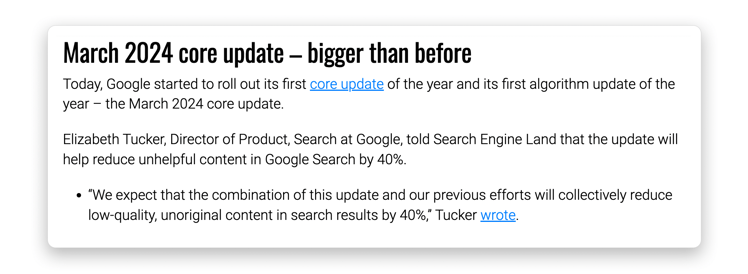The short answer is YES! Of course. When blog content is deployed properly as part of a dealership's all-encompassing SEO strategy, your dealership can see big wins by having a blog.
On the heels of NADA 2024, we've heard a recurring question when it comes to car dealer search engine optimization strategy. Oddly, there seems to be much debate around the question of whether or not blogging is a worthwhile SEO activity for car dealers.
In this article, we're going to explore the ins and outs of this question and see if we can't put the debate to rest once and for all.
First, let's look at what blogging is so that we can explore the most valuable ways to utilize a blog on your dealership website. Simply put, blogs are a way to present a mix of written, video, and. image content around specific topics through a chronological index on your website.
From marketing, branding, and community outreach to search engine optimization and inbound authority building, blogs are a versatile way to express and deepen the authority that your dealership has around high-intent search topics.
That said, it's important to also understand why people think blogging is a dying concept. In September 2023, Google rolled out a core algorithm update that made it clear they are deepening their investments in A.I. and helping consumers get answers to common questions as quickly and efficiently as possible. Think Gemini, a smart assistant built by Google that ties into their search index and presents simple answers to user queries.
After the update, the speculation about blogging as an important marketing activity was called into question. People's minds went into overdrive and bloggers (yes bloggers) went on a frenzy writing blogs (yes blogs) about why blogging might be dying.
Here's the thing, though... People are kinda dumb. They rush to conclusions and can't wait to express their newfound opinion without giving topics enough time to normalize and see where things will actually land. We saw this with the metaverse, clubhouse, NFTs, and electric cars. We see this in nearly every facet of life, and being frank, it's probably one of the most annoying things we do as human beings.
But the question still stands: What of blogging anyway? Does having a blog on my dealership website help with search engine rankings?
The short answer (since that's apparently what Google wants to see) is YES! Of course. When a blog is deployed properly as part of a dealership's all-encompassing SEO strategy, your dealership can see big wins by having a blog.
Take a look at this:
Google's March core algorithm update has an emphasis on squashing low-quality, unhelpful content. Simply put, if your blog is just a dumping ground for random content that doesn't enforce an overarching SEO strategy, then you're probably better off not wasting time posting at all.
Luckily, FlexDealer has kept our client partners ahead of the curve for well over a decade because we know the value that high-quality content brings to a dealerships overall search rankings.
Some companies that sell SEO services to automotive dealers want you to believe that your dealership website is an e-commerce site, similar to Amazon or Best Buy and should fully be treated as such. They make the argument that it's impossible to compete with nationally ranked websites that cater to research behavior. They say that it's pointless to build topical depth because ranking for research related terms is difficult. They say that all of your attention should focus on geo-targeted pages that are transactional in nature, because after-all, "dealership websites are e-commerce websites."
But look at these dealerships whose first-page rankings for the search term "Ford F-150 vs Toyota Tundra" show up alongside and/or higher than the national research sites.
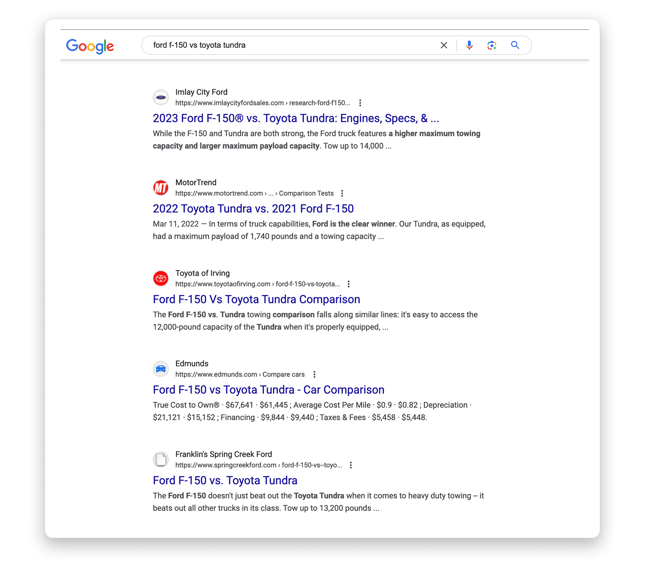
Just to be sure, let's look at another research-related comparison term. Here we have dealership websites ranking alongside the massive forum site, Reddit. How can this be?
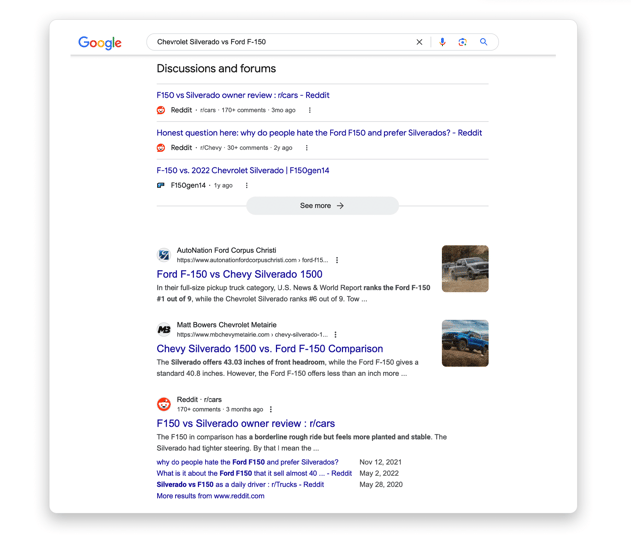
Are Dealership Websites Considered E-Commerce Sites?
Let's address the elephant in the room. Are dealership websites viewed by Google as e-commerce websites? Knowing the answer to this question makes a load of difference in how they are both indexed and viewed by the search engine.
To get to the bottom of it, I reached out to my contact from Google's Automotive Retail team. Here's what they had to say:
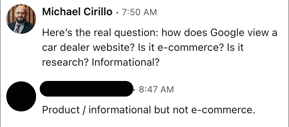
They continued...
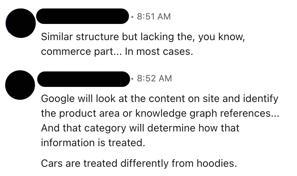
Lastly:
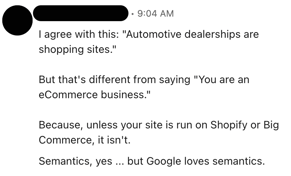
There's something worth noting here. FlexDealer's powerful inventory management/marketing software (a.k.a. LiftKit) includes a data layer for every piece of inventory called Advanced Schema Markup. This means that every vehicle listed on your dealership website (powered by us) injects code directly into Google's algorithm that identifies the year, make, model, features, geo-coordinates, and dealership contact information for every vehicle on your site.
Why is that important? Because it adds a layer to our SEO strategy that reaches beyond blogs and into the realm of hyper-local inventory specific landing pages on site. We're not just saying that your dealership will rank because it has a blog. Nor should you believe that all we do for SEO is blogging. That would be a foolish assumption. The original statement is that when utilized as part of a larger strategy, blogs can drive high-intent search traffic to your website to enter shopping activities with research certainly being a shopping activity; our technology together with our services create an impactful way to dominate search results and drive traffic from all phases of the buying journey - exactly what a product/information/shopping website should do.
Our advanced vehicle data code injection turns every inventory listing on your website into a hyper localized model landing page and eliminates the guesswork of Google's algorithms to try and understand the context of your website. Notice how my Google contact stated, "Google will look at the content on site and identify the product area of knowledge graph references..."
Onto the next logical question: How does FLX use blogging to help rank dealer websites? Let's break down the process.
1. Our Blogging Methodology for Car Dealers
For those in the back, I'll say it again. Blogging is only one aspect of our philosophy around SEO. As such, it's important to know where we see it fits into the mix. We believe (and our experience has proven) that blogs are a great way to deepen the authority of product specific landing/anchor content pages on the dealer's website.
Google follows internal links on a website to help understand its content and site structure. We utilize blog articles to a.) persuade people in higher phases of the buying journey to move down the funnel and b.) move them on to shopping activity via internal links. Each blog article links to an anchor piece of content; whether a geo-specific model landing page, or a vehicle search results page for active/in-stock inventory (remember our inventory is marked up with a geo-specific data layer).
In order to be a relevant internal link, we use blog articles to break down questions related to the anchor topic. For example, if the main anchor page is about a 2024 GMC Sierra 3.0L Diesel in Dallas, TX, we will use blog articles to answer high-intent questions about that vehicle. What is its towing capacity? Can it be customized? What's the difference between a Ford diesel truck and a GMC diesel truck? You get the idea.
We do this because it works. In fact my good friend, Marcus Sheridan wrote a bestselling book about this very topic, titled, "They Ask, You Answer." In other words, every Google search is an implied question. If you're the dealership who answers the question, you'll outrank your competitors and also drive higher-intent searchers to your website.
There's also an indirect psychological benefit. When you're the only one answering someone's question, their trust in you deepens and when it comes time for those more transactional conversations, they will choose to have them with you. How do we know? Because it's one of the most quoted sayings in our industry: People purchase vehicles from those they both like and trust. It's hard to hate you when you've been so helpful.
In this way, we're able to not only add topical depth to your website, we're also able to deepen the roots of top-level, geo-specific content that is more transactional (shopping) related.
One last thing to look at. Here's an example from one of our client partner's GA4 accounts. A small store located in a rural town. Four of their top 10 landing pages driving traffic are from blog articles. Read that again.
2. Keyword research and opportunity discovery
Our search team reviews keyword opportunities that map to your core business goals. From there we look for gaps between their website and their competitors to determine where the openings are. Once we discover keyword opportunities, we cross reference that data to Google trends, SEMRUsh, Answer The Public, GA4 data, local market insights, high performing ad campaigns and other sources to gauge how important those keyword topics are to the market.
2. Build topical depth
Google loves websites that go deep on relevant topics for the end user. As mentioned earlier, FLX follows a simple formula for building out topical authority that our friend Marcus Sheridan wrote a bestselling book about. They ask, you answer. This formula is exactly what it sounds like. Everyday millions of car shoppers go online asking questions of Google. Whichever website (dealership) does a better job answering those questions will rank higher and attract more website traffic.
Going one step deeper, the more content provided around a specific and relevant topic the more favor a dealership's website gains in the eyes of Google. Especially now that you know they are product/information sites and not full e-commerce websites. Topical depth means that there isn't just a model landing page for a GMC Sierra 3.0L Diesel. It means that in addition to the main model landing page, there are several articles that point to and support the main page. Relevant blog articles are a great way to bolster up those main topics on a website by answering each and every question surrounding a particular topic.
3. E,E,A,T
Which stands for Experience, Expertise, Authoritativeness, and Trustworthiness. That's the criteria that Google uses to evaluate the credibility and relevance of web pages and websites today. FLX layers in blog articles to help support the experience of providing all the information a customer is looking for during their purchase process. That information, when following the previous two steps (Keyword research and topical depth) emphasize the dealer's expertise and authority around those topics. As a result, trustworthiness increases.
4. A Sneak Peak Into Our Other Automotive SEO Activities
One last time shall we? Blogging is a small portion of our SEO work. If you're interested in the other aspects of SEO we tackle, here's a brief rundown.
- In depth keyword/keyphrase discovery, which informs our;
- High-quality, human-written content, local landing pages, and model-specific pages, that establish our;
- Topical depth and increases the website’s authority, so that we can;
- Build relevant backlinks that send signals to Google the dealer's website is worth ranking higher than their competitors
- Local SEO including citation/NAP directory submissions and fixes
- Google Business Profile updates and optimization
- Technical errors
- On-page SEO to ensure that their website meets all of Google’s best practices
- Keep up with search algorithm updates and make tweaks as needed
- Monitor new rankings for growth and productivity
Conclusion
The short answer is, Yes! Blogging can help increase the ranking of a dealership website when it's deployed strategically as a part of their overall marketing program. By adhering to some straightforward best practices that include keyword research, opportunity discovery, topical depth, and E,E,A,T, we find that blogs overall contribute productively to increased rankings and higher-quality website traffic.
Interested in deepening your dealership SEO strategy? Let's chat!

